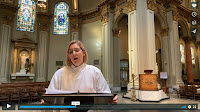 "How much love there must be in the Lord, considering he sent Christ to be crucified for sinners and for the wicked, and redeemed us at the price of his blood, us who were his enemies by loving the things he makes instead of him who made them! So while we were doing that sort of thing, God sent his Son (Gal 4:4), as the apostle says, and handed him over to be slain for wicked us and all other wicked people. And if a gift like that was given to people who were not yet believers, what must he be keeping for those who are believers? That's how much God loves men. But . . . does this mean he doesn't scourge them? Does it mean he doesn't reprove them? If he doesn't reprove them, how do you explain famine, how do you explain sicknesses, epidemics and diseases? They are all God's ways of reproving us [(si non illos corripit, unde fames, unde aegritudines, unde pestilentiae et morbi? omnes enim istae correptiones dei sunt)]. If then he loves and yet reproves, do likewise yourself; if you have anyone under your authority, while you maintain your feeling of love [(affectum dilectionis)] for them do not deny them the rod of correction. If you do refuse it, you will not be maintaining your love."
"How much love there must be in the Lord, considering he sent Christ to be crucified for sinners and for the wicked, and redeemed us at the price of his blood, us who were his enemies by loving the things he makes instead of him who made them! So while we were doing that sort of thing, God sent his Son (Gal 4:4), as the apostle says, and handed him over to be slain for wicked us and all other wicked people. And if a gift like that was given to people who were not yet believers, what must he be keeping for those who are believers? That's how much God loves men. But . . . does this mean he doesn't scourge them? Does it mean he doesn't reprove them? If he doesn't reprove them, how do you explain famine, how do you explain sicknesses, epidemics and diseases? They are all God's ways of reproving us [(si non illos corripit, unde fames, unde aegritudines, unde pestilentiae et morbi? omnes enim istae correptiones dei sunt)]. If then he loves and yet reproves, do likewise yourself; if you have anyone under your authority, while you maintain your feeling of love [(affectum dilectionis)] for them do not deny them the rod of correction. If you do refuse it, you will not be maintaining your love."St. Augustine, Sermon 5.2 (405/410), trans. Hill (WSA III/1, 217-218). Latin from CAG (Past Masters):
quanta ergo dilectio est in domino, quando pro peccatoribus et impiis Christum crucifigendum misit et pretio sanguinis eius non redemit, qui ei inimici eramus amando ea quae facit pro eo qui fecit! cum ergo ista faceremus, «misit deus », sicut apostolus dicit, «filium suum », et eum pro nobis impiis ab aliis impiis occidendum tradidit. et si nondum fidelibus tantum munus datum est, quid ergo seruatur fidelibus? ecce quomodo deus diligit homines. attendamus, fratres, numquid non illos flagellat? numquid non illos corripit? si non illos corripit, unde fames, unde aegritudines, unde pestilentiae et morbi? omnes enim istae correptiones dei sunt. si ergo ille diligit et tamen corripit, sic et tu, si habes aliquem in potestate, quamuis serues affectum dilectionis, noli tamen negare flagellum correptionis. quia si negaueris, non tenebis dilectionem; quia ille moritur in peccatis, qui forte correptus ea relinqueret; et magis tibi imputatur uerum odium.


